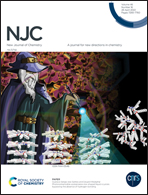Assessment of time-dependent density functionals for the electronic excitation energies of organic dyes used in DSSCs†
Abstract
The absorption spectra modeled as the vertical excitation energies of 13 dye sensitizers used in dye-sensitized solar cells (DSSCs) are benchmarked by means of time-dependent (TD)-DFT, using 36 functionals from different DFT rungs. Most TD-DFT results were found to produce significant errors in the calculated excitation energies, and show mean absolute error (MAE) values in the range 0.3–1.2 eV. The double-hybrid functional B2GPPLYP provides the best performance among all functionals, with the lowest MAE value (0.126 eV) and the lowest standard deviation (0.091 eV). Other functionals with good performance also include M06-2X (MAE = 0.184 eV, SD = 0.122 eV), CAM-B3LYP (MAE = 0.198 eV, SD = 0.134 eV), and BH&HLYP (MAE = 0.209 eV, SD = 0.144 eV). On the other hand, the range separated hybrid functionals (except CAM-B3LYP) and the range separated double hybrid functionals are not recommended for the computational predictions of the excited state properties of organic dye sensitizers.



 Please wait while we load your content...
Please wait while we load your content...